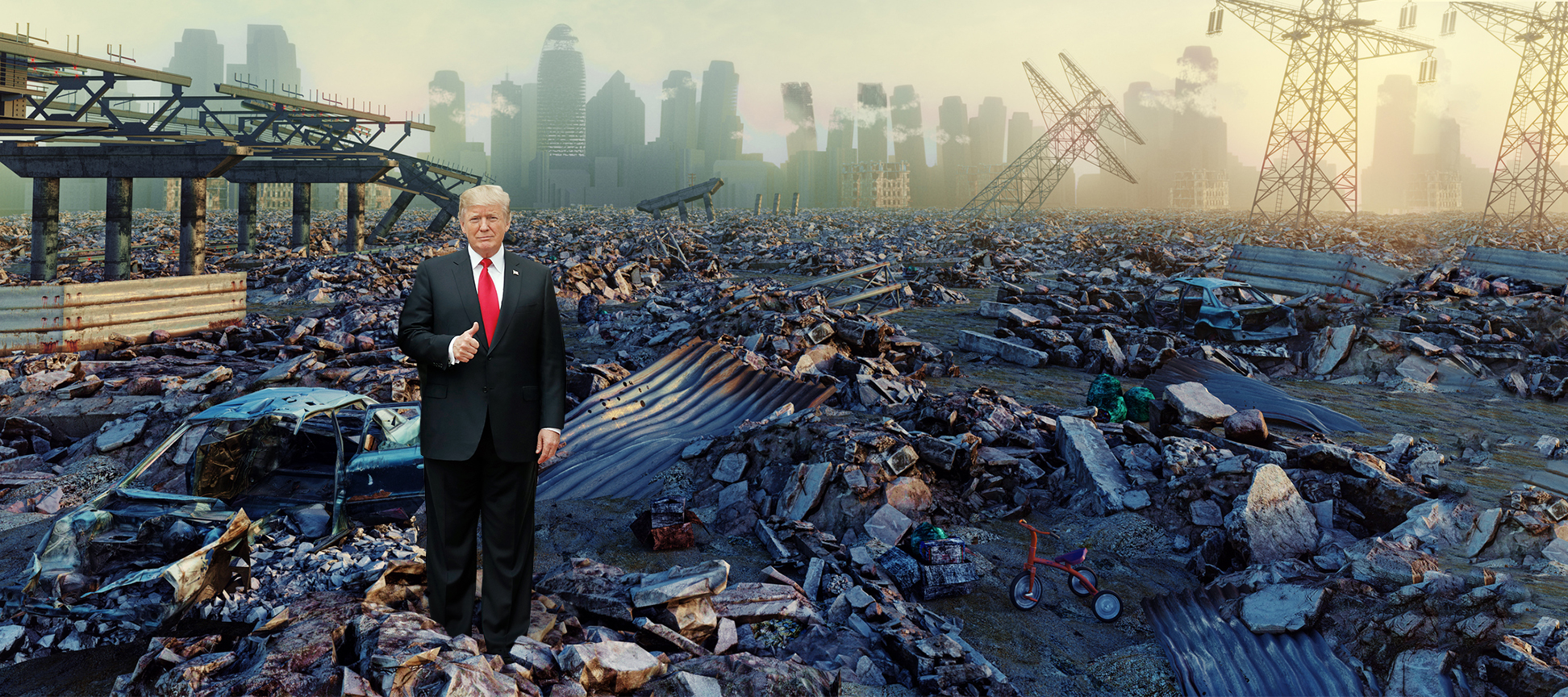Trump's predictably ruinous strategy in the trade war
What is he even trying to do? Trump himself probably doesn't even know.


President Trump's trade "policy," if we can call it that, is continuing pretty much exactly as one might have suspected. On Monday, China announced a new series of tariffs in response to Trump's levies on steel and aluminum. The White House responded Tuesday with new tariffs on some 1,300 specifically Chinese goods. China then hit back Wednesday by slapping tariffs on a bunch more American products, most of them agricultural. So far, the overall trade volume of affected goods is not too large, and most of the tariffs haven't taken effect yet. Thus, after the markets plummeted at Wednesday's opening bell on escalation fears, they eventually recovered on the assumption that the White House would pull back.
I wouldn't be so sure that it will. There is no clear negotiating strategy from Trump — indeed, no sign that he even knows what he wants, much less how to achieve it. There's a serious risk of a trade war that will escalate indefinitely.
As ever with trade, it's important to emphasize that the current international trade system really is seriously dysfunctional in a way that harms the United States and many other countries. America's huge trade deficit means dollars going out of the country that could otherwise be spent on U.S. goods and services. The $375 billion trade deficit with China alone in 2017 could support a lot of jobs. (It's not a bad thing that China has reached middle-income status, of course, but that could have easily happened without flushing whole built-up industrial cities in the Rust Belt down the toilet.)
The Week
Escape your echo chamber. Get the facts behind the news, plus analysis from multiple perspectives.

Sign up for The Week's Free Newsletters
From our morning news briefing to a weekly Good News Newsletter, get the best of The Week delivered directly to your inbox.
From our morning news briefing to a weekly Good News Newsletter, get the best of The Week delivered directly to your inbox.
But on the other hand, that huge deficit is partly the result of the fact that the U.S. dollar is the de facto world reserve currency. Any other country in America's place would have long since suffered a balance of payments crisis and a sharp currency devaluation. Our gigantic trade deficit can be sustained because of the continual demand for dollar-denominated assets to settle international accounts, which is both a blessing and curse.
What the world needs is a managed trade system that would make the dollar's reserve position unnecessary, and incentivize nations to keep their trade roughly balanced in both directions. Large deficits are bad, but by the same token so are surpluses (there must be a lender for every debtor). Germany and China should be pressed to bring their trade into balance just as deficit countries should.
But even that fairly simplistic level of understanding is completely beyond our chump president. Instead, as far as I can tell, all Trump has is an instinctive suspicion of China, a desire to punish and dominate them in a way that will be interpreted as delivering benefits to blue-collar white Americans — but no idea as to how to achieve that end, much less the determination and savvy negotiating skills it would take to achieve it.
After all, China's gigantic trade surplus with America puts it at a fundamental disadvantage. A total cessation of trade would hurt China a lot more than it would the U.S. So even if a new world trade system was judged to be aiming a bit too high, it would be perfectly reasonable to announce a negotiation effort aimed at reducing the trade deficit with China by, say, 40 percent or so, with the implicit threat of tariffs and other measures if it doesn't work out. (Negotiation pro tip for President Deals: announce what you want to achieve before you start trying to punish an adversary for not doing it. Otherwise, they might be a wee bit confused.)
A free daily email with the biggest news stories of the day – and the best features from TheWeek.com
China's leadership, composed as it is by intelligent people with a decent grasp on policy, are aiming their tariffs directly at so-called Trump Country — rural, conservative places that export a lot of food, as well as manufacturing regions. The objective, pretty clearly, is to be to put pressure on Republican congressmen from Trump's base regions, who can then press the president to roll back his tariffs. A straightforward, logical strategy at the least.
However, I wouldn't be too confident it will work. Intelligent people often struggle to understand incredibly stupid or ignorant ones. President Trump is an oblate lump of resentment, prejudice, and sexual neurosis, marinated for decades in the poison stew of cable news and reactionary media. Logic has a tough time getting through. It is possible he'll grasp the Chinese strategy and figure it isn't worth the fight, or (more likely) simply get bored and give up. But he also might get his ego tangled up in the dispute, and keep lashing out with more and more tariffs.
Only time will tell which road we're going to be stuck on.
Ryan Cooper is a national correspondent at TheWeek.com. His work has appeared in the Washington Monthly, The New Republic, and the Washington Post.
-
 Why is London’s property market slumping?
Why is London’s property market slumping?Today's Big Question Some sellers have reported losses of hundreds of thousands of pounds
-
 Quiz of The Week: 10 – 16 January
Quiz of The Week: 10 – 16 JanuaryQuiz Have you been paying attention to The Week’s news?
-
 Woman in Mind: a ‘triumphant’ revival of Alan Ayckbourn’s dark comedy
Woman in Mind: a ‘triumphant’ revival of Alan Ayckbourn’s dark comedyThe Week Recommends Sheridan Smith and Romesh Ranganathan dazzle in ‘bitterly funny farce’
-
 The billionaires’ wealth tax: a catastrophe for California?
The billionaires’ wealth tax: a catastrophe for California?Talking Point Peter Thiel and Larry Page preparing to change state residency
-
 Bari Weiss’ ‘60 Minutes’ scandal is about more than one report
Bari Weiss’ ‘60 Minutes’ scandal is about more than one reportIN THE SPOTLIGHT By blocking an approved segment on a controversial prison holding US deportees in El Salvador, the editor-in-chief of CBS News has become the main story
-
 Has Zohran Mamdani shown the Democrats how to win again?
Has Zohran Mamdani shown the Democrats how to win again?Today’s Big Question New York City mayoral election touted as victory for left-wing populists but moderate centrist wins elsewhere present more complex path for Democratic Party
-
 Millions turn out for anti-Trump ‘No Kings’ rallies
Millions turn out for anti-Trump ‘No Kings’ ralliesSpeed Read An estimated 7 million people participated, 2 million more than at the first ‘No Kings’ protest in June
-
 Ghislaine Maxwell: angling for a Trump pardon
Ghislaine Maxwell: angling for a Trump pardonTalking Point Convicted sex trafficker's testimony could shed new light on president's links to Jeffrey Epstein
-
 The last words and final moments of 40 presidents
The last words and final moments of 40 presidentsThe Explainer Some are eloquent quotes worthy of the holders of the highest office in the nation, and others... aren't
-
 The JFK files: the truth at last?
The JFK files: the truth at last?In The Spotlight More than 64,000 previously classified documents relating the 1963 assassination of John F. Kennedy have been released by the Trump administration
-
 'Seriously, not literally': how should the world take Donald Trump?
'Seriously, not literally': how should the world take Donald Trump?Today's big question White House rhetoric and reality look likely to become increasingly blurred
